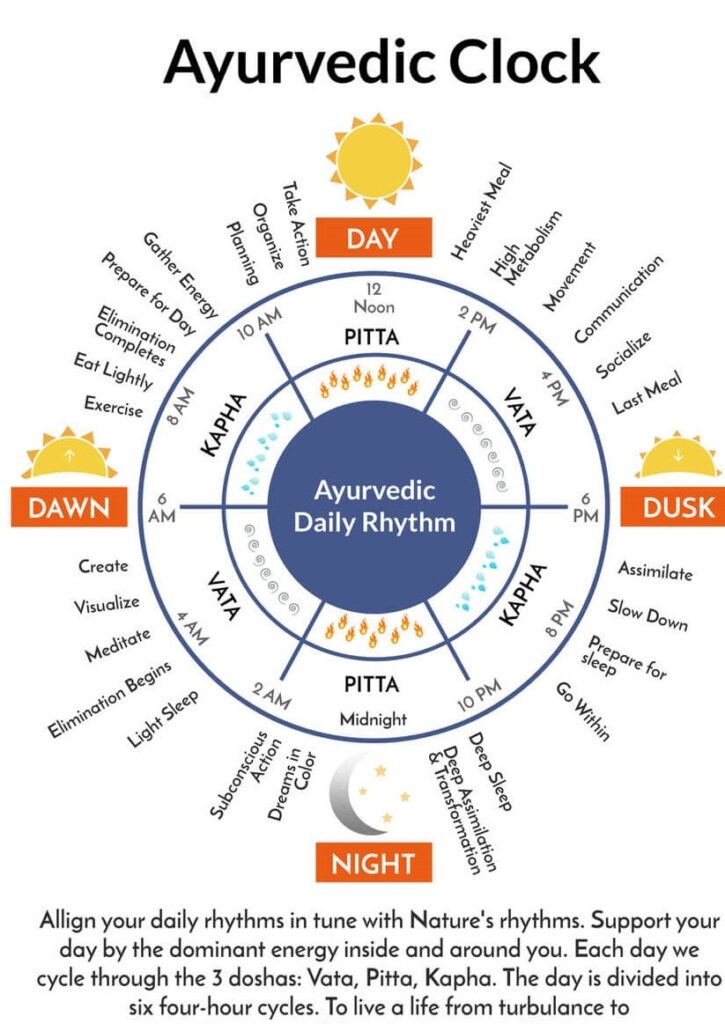

Ayurveda defines cycle of time in our life and especially in our daily life. If you want to get balance in your mind, body and soul you have to respect these cycles. They are cycles of your own nature but also the cycle of Mother Nature.
Have you ever found that if you sleep too much you feel heavy and lazy all day long?
Ayurveda has a fairly simple explanation for all of this. There is a natural ebb and flow in the natural world, including your own body and mind.
Do you feel hungry around 10 p.m?
Or maybe sometimes you wake up at 4 a.m worrying and have a hard time falling back asleep…
Vata, Pitta and Kapha are energetic forces that govern the tides of your life, and also your your day.
If you understand these forces, you can tune into the natural rhythms of the world. And make informed choices to help you to get healthy and harmonious life.
In other words, there is a vata, pitta and kapha hour of the day and a vata, pitta and kapha hour of the night. Understanding this allows you to choose activities, food choices, etc. That will support the dominant energy in and around you at that time.


The ayurvedic cycle of Kapha time
Let’s start with the Kapha time of the day, as it always starts with the Kapha dosha.
Ayurveda teaches that it is best to get up in the morning before 6 a.m, because at 6 a.m. Kapha becomes dominant. Kapha is the energy of water and earth, and is therefore heavy and slow. If you wake up during kapha time, which is between 6.00 and 10.00, these qualities will increase in you. You will say “I overslept, and I struggled to wake up,”
It is better to get up before 6 a.m. and participate in a morning activity. You will to get your heart racing and start your day with energy.
Breakfast is actually a fairly light meal as it is still in Kapha time.
The ayurvedic cycle of Pitta time
Time runs out in Pitta, which starts at 10:00 am and continues until 2:00 pm.
Pitta governs productivity time, when the sun is highest in the sky and there is more heat in the natural world.
Pitta is the dosha of heat, for it is made of fire and water. At this time of day, heat naturally predominates in our body and mind. By harnessing this midday heat, we are determined to be productive and achieve our goals.
However, it is best to avoid spending time in direct sunlight at this time of day, especially engaging in vigorous activity in the sun>
If you are predominantly pitta, as those with a pitta nature are likely to experience an increase in heat symptoms in the body at this time. You can experienced burning indigestion, rashes, or even mood swings. And as mentioned above, lunch is the time when you can enjoy a big meal the most. As you are best able to digest it at this time, as digestion is a fiery process and will be supported by the heat of the meal


The ayurvedic cycle of Vata time
The pitta time of the day fades when Vata time begins, around 2:00 p.m. Vata continues until 6:00 p.m. as day gives way to night. Vata, which is made up of the elements air and space (ether), governs the transition time.
The naturally light and ethereal qualities of this time of day allow creativity and expansive thinking. Make it a great time to engage in creative pursuits and problem solving.
However, it can also be a time when people of a vata nature may experience restlessness, so choose a calm environment in which you can work while minimizing excessive sensory input such as bright lights and noise.
Instead, settle into a peaceful environment and grab a cup of herbal tea and a warm blanket. Vata is the most delicate of the doshas, and the most likely to become imbalanced, as it is the dosha of movement. By keeping him at ease at this time of day, his creative gifts can manifest and imbalances avoided.
As the cycle continues and we move towards night, the dosha times repeat themselves.
Ayurvedic cycles of time at night
Kapha time
Kapha becomes dominant again from 6:00 p.m. at 10 p.m, when the water and earth elements accumulate again. These heavy qualities tell you it’s time to relax. Eat a light, early dinner (don’t overeat at dinner – avoid heavy foods), and settle in for the night.
Around 10 p.m, you have to sleep. By going to bed during the kapha hour, the heaviness of this hour will help you fall asleep easily and naturally.
In the last hour or two before bed (around 8:00 p.m. to 10:00 p.m.), only engage in calming activities that nourish and soothe you. No fuss, no painful conversation, no violent TV shows – or it can interfere with sleep! Instead, take a hot bath, sip tea by the fire, listen to soothing music, enjoy a light conversation with loved ones.
Pitta Time
At 10 p.m., I hope you are well in bed, sound asleep. This is important because Pitta regulates activity and while you sleep is no exception. The pitta time of the night is from 10:00 p.m. to 2:00 a.m. It is important because this is the time of internal cleansing.
If you stay awake during this important time, you are missing out on the benefits of this hour of cleansing. In fact, if you’re still awake you might find that the food cravings kick in and find yourself in the fridge. Looking for ice cream or leftover pizza, as the digestive force is going to search for something to digest. . Your body will thank you for skipping this and falling asleep instead!
Vata Time
Vata Time returns from 2:00 a.m. to 6:00 a.m, marking another transition time. However, early morning vata time is not a time of creativity, but rather of receptivity. Yogis long ago discovered that this time of day, when air and ether dominate, is the best time for meditation, prayer, chanting, and other spiritual practices.
By getting up before 6:00 a.m, you are able to maximize this experience, spending that peaceful time of day in spiritual activities.
If you are still in bed, you may find that your sleep is light and disturbed, or that you wake up and find it difficult to close your mind. Meditation at this time can be a challenge for some, especially if you have a lot of vata in your nature or have a vata imbalance.
Using a mantra or affirmations, doing yoga and pranayama can be very helpful in calming the mind. Having a cup of warm milk in the evening before bed with a pinch of freshly grated nutmeg is good. Do gentle yoga, or inhaling soothing essential oils such as lavender or jatamansi to calm the mind. You can aslo practice soothing pranayama like Nadi Shodhana.
By listening to nature’s signals and following her rhythms, she will reward you with health, balance and peace of mind.
References
[Physiology of the biological clock] – PubMed (nih.gov)
Biological rhythms: clocks for all times – PubMed (nih.gov)
Biological clocks and the digestive system – PubMed (nih.gov)
[Biological clocks of food] – PubMed (nih.gov)
Biological clocks: mechanisms and developments – PubMed (nih.gov)
